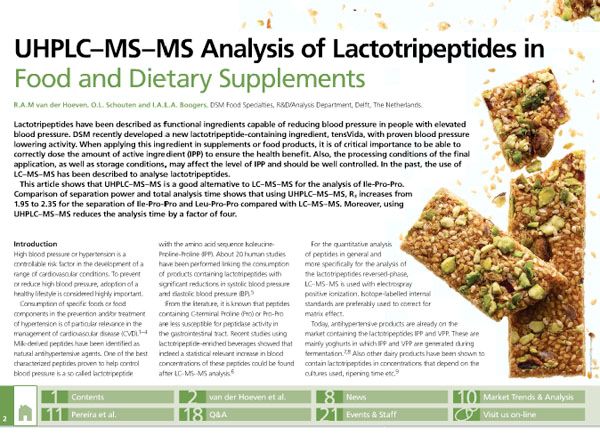UHPLC–MS–MS Analysis of Lactotripeptides in Food and Dietary Supplements
Discover the advantages of using UHPLC–MS–MS for lactotripeptide analysis
Lactotripeptides have been described as functional ingredients capable of reducing blood pressure in people with elevated blood pressure. DSM recently developed a new lactotripeptide-containing ingredient, tensVida, with proven blood pressure lowering activity. When applying this ingredient in supplements or food products, it is of critical importance to be able to correctly dose the amount of active ingredient (IPP) to ensure the health benefit. Also, the processing conditions of the final application, as well as storage conditions, may affect the level of IPP and should be well controlled. In the past, the use of LC–MS–MS has been described to analyse lactotripeptides.
This article shows that UHPLC–MS–MS is a good alternative to LC–MS–MS for the analysis of Ile–Pro–Pro. Comparison of separation power and total analysis time shows that using UHPLC–MS–MS, Rs increases from 1.95 to 2.35 for the separation of Ile–Pro–Pro and Leu–Pro–Pro compared with LC–MS–MS. Moreover, using UHPLC–MS–MS reduces the analysis time by a factor of four.
Analytical Challenges in Measuring Migration from Food Contact Materials
November 2nd 2015Food contact materials contain low molecular weight additives and processing aids which can migrate into foods leading to trace levels of contamination. Food safety is ensured through regulations, comprising compositional controls and migration limits, which present a significant analytical challenge to the food industry to ensure compliance and demonstrate due diligence. Of the various analytical approaches, LC-MS/MS has proved to be an essential tool in monitoring migration of target compounds into foods, and more sophisticated approaches such as LC-high resolution MS (Orbitrap) are being increasingly used for untargeted analysis to monitor non-intentionally added substances. This podcast will provide an overview to this area, illustrated with various applications showing current approaches being employed.
Polysorbate Quantification and Degradation Analysis via LC and Charged Aerosol Detection
April 9th 2025Scientists from ThermoFisher Scientific published a review article in the Journal of Chromatography A that provided an overview of HPLC analysis using charged aerosol detection can help with polysorbate quantification.
Removing Double-Stranded RNA Impurities Using Chromatography
April 8th 2025Researchers from Agency for Science, Technology and Research in Singapore recently published a review article exploring how chromatography can be used to remove double-stranded RNA impurities during mRNA therapeutics production.








